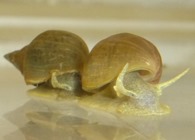Captive breeding alters snail behaviour

Slime trail following is found in many marine and freshwater snails
14 January 2015
Research published today in the Journal ofMolluscan Studies carried out by Dr Sarah Dalesman, Leverhulme Trust Early Career Fellow at Aberystwyth University’s IBERS, and James Liddon (University of Exeter) has discovered that rearing snails in the laboratory can cause important changes in their behaviour.
The study investigated trail following; a behaviour found in many marine and freshwater snail species and frequently used by the snails to locate other individuals.
Lead author James Liddon explains: “We found that great pond snails follow the slime trails laid down by other snails as they move. What we found really surprising was that rearing the snails in the laboratory changed this behaviour relative to wild snails. This difference between wild and laboratory reared snails only occurred when they had been socially isolated for a week before we tested them.”
Principal investigator on this study, Dr Dalesman said: “We predicted that isolating the snails would increase their drive to find other snails and increase trail following behaviour. What we actually found was that trail following was decreased in isolated laboratory reared snails, but not affected in isolated wild snails.”
Imagine if you’re used to living in a house full of people and are then forced into living alone for a prolonged period. After a while you might start to feel lonely and it would affect how you act.
However, if you are used to living alone then you might cope better with being isolated for a while. Dr Dalesman said: “We think something similar might be happening with the snails”. She went on to add: “Laboratory snails are used to living in close quarters with other individuals and used to frequent social contact, and so isolation is more stressful for them. Wild snails will only occasionally bump into other individuals in their natural environment, so find social isolation less of a problem.” Previous work has shown that social isolation acts as a stress for laboratory reared snails, changing their ability to form memory.
Captivity is known to affect important behaviours relating to predator avoidance and mate finding in mammals and fish for example, but the impact upon invertebrate behaviour is often not considered. This study highlights the importance of considering how captive breeding changes the environment for invertebrates relative to their wild counterparts, and that this can have a strong impact on how they behave.
The Institute of Biological, Environmental and Rural Sciences (IBERS) is an internationally recognised research and teaching centre providing a unique base for research in response to global challenges such as food security, bioenergy and sustainability, and the impacts of climate change. IBERS scientists conduct basic, strategic and applied research from genes and molecules to organisms and the environment.
IBERS receives strategic research funding of £10.5m from the BBSRC to support long term mission driven research, and is a member of the National Institutes of Bioscience. IBERS also benefits from financial support from the Welsh Government, DEFRA and the European Union.
AU1715



